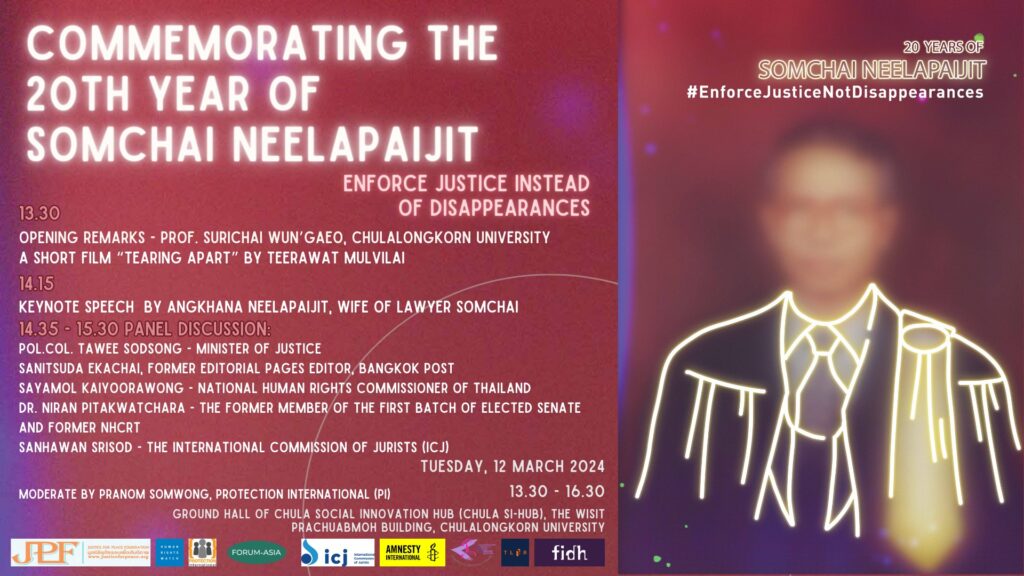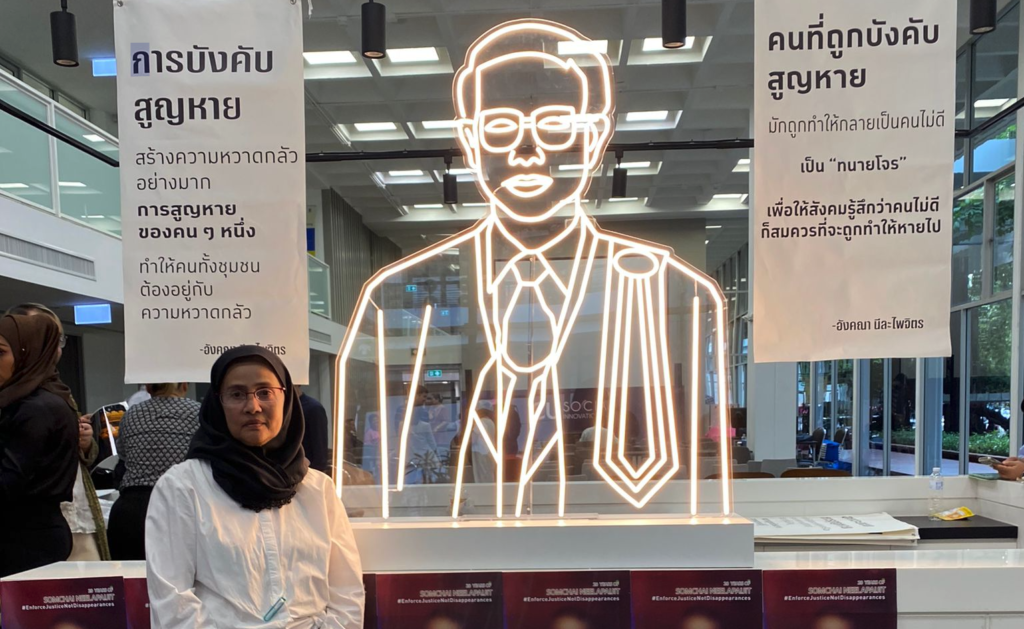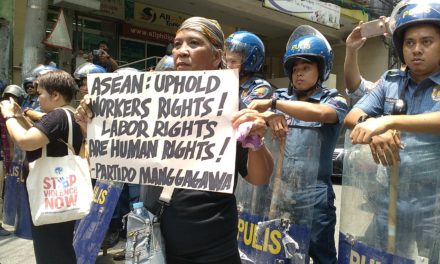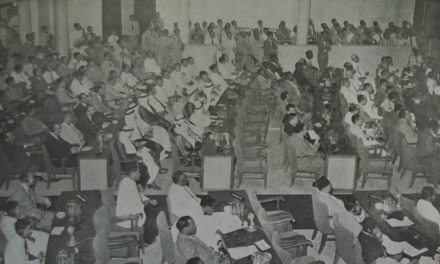
Twenty years ago, Somchai Neelapaijit, an outspoken human rights lawyer and senior member of two prominent lawyers’ associations of Thailand, was forcibly disappeared in the Ramkhamhaeng district of Bangkok. It is believed that his disappearance was related to his work as a lawyer defending the rights of Muslim minorities who were subjected to torture and other ill-treatment in military detention in Thailand’s southern border provinces where Martial Law has been imposed since January 2004.
Somchai Neelapaijit was also a husband and a father of five children. Since his disappearance, Angkhana Neelapaijit, the wife of Lawyer Somchai, and their five children have never given up hope of bringing their loved one home. Their journey, especially for Ms. Angkhana, involves threats and reprisals in seeking truth and justice for her husband. As a woman, she has witnessed how the impact of enforced disappearance could further unfold years after the incident affecting her children and herself – similarly to what happens with other families of the disappeared.
Focus on the Global South commemorates Lawyer Somchai’s human rights vocation and honors the living struggles of the Neelapaijit family and other families of the disappeared.
On this occasion, we are honored to publish the Keynote Speech by Ms. Angkhana Neelapaijit, the wife of Lawyer Somchai and currently a member of the UN Working Group on Enforced or Involuntary Disappearances, on the commemoration session co-organized by human rights organizations in Thailand, “Enforce Justice Instead of Disappearances: Commemorating the 20th Year of Somchai Neelapaijit” on 12 March 2024, at Chulalongkorn University.
The original version of the speech was written in Thai. The English version was translated, thankfully, by Thitiworada Koitong.

Angkhana Neelapaijit at the event “Enforce Justice Instead of Disappearances — Commemorating the 20th Year of Somchai Neelapaijit”, 12 March 2024 at Chulalongkorn University. Photo by Kheetanat Wannaboworn.
Keynote Speech by Ms. Angkhana Neelapaijit
(Original Thai version here)
I feel deeply honored to stand before my dear friends and all of you today, to express my gratitude for the friendship and encouragement you have given to me and many families of the disappeared over the past years. For the families, enforced disappearances are the reminder of the injustice perpetrated by the state, which persists and is still devoid of any justice.
On the 20th anniversary of the disappearance of Somchai Neelapaijit, I would like to take this time to narrate the story of injustice, the truth suppression, and the issue of impunity in Thai society from the perspective of a female victim. I believe that addressing human rights issues through the experiences of women is significant to reflect the processes of our thinking, decision-making, how we face pressure, and deal with the challenges of intimidation and harassment along the path to seeking justice, under the painful and shattered mental states, and the never-ending hope.
I hope that the story of the enforced disappearance of Somchai Neelapaijit will illustrate why I, along with many other victims, am dedicated to certain shared missions. Some people may find it annoying and tiresome to hear repetitive stories. Some people may think that there is no point talking about the old stories. Nevertheless, I wanted to tell everyone that we will never be truly aware of the importance of rights and human dignity until certain values are taken away from our lives.
Every time I speak about the stories of the disappeared, I feel very tiny in comparison to the immense hearts of their families. Despite failures and ridicule, the women in the families have never lost faith and trusted that one day the truth will surface, and those who have disappeared will return to their families.
Yesterday, someone asked me whether my children and I still lived in our original home. For the families of the disappeared, home is a place with memories. Most families therefore remain in the same place, hoping that one day their lost loved ones will return. While some families have had to move, their children often continue to visit the old home with the hope that “Dad might come back.”
Today, some of you may ask, “Who is Somchai Neelapaijit? Why do we need to talk about him?” For the family, Somchai was an ordinary lawyer born into a farming family, not affluent but living a modest life. Somchai was a person with both virtues and mistakes. In order to help those who face injustice, he used his earnings to help others in need. He taught his children the value of savings to share with those facing greater difficulties. He never referred to himself as a “human rights lawyer.” He might differ from other lawyers in that he could not bear seeing powerless people oppressed by state authorities. He had dedicated himself to protecting those unfairly treated without any fear for potential dangers. Somchai never thought that his clients were all right, but he believed that wrongdoers should get punishment for their deeds and should not be slandered, tortured, or forced to disappear. … It is unbelievable that working fearlessly to protect the principles of law and justice, and scrutinizing the duties of the police straightforwardly, would lead him being made to vanish from the lives of many people.
Many asked me if Somchai, knowing that pursuing justice might cause him pain, suffering, and separation, would continue his work. In the 24 years we had lived together before he disappeared, I believe that regardless of the circumstances, he would not abandon his beliefs and principles. He would never regret what happened.
Twenty years ago, after Somchai’s disappearance, the atmosphere at home became silent and covered with fear. It is difficult to describe the feelings on that day, the day when close friends and several relatives became distant from our lives and left only women and children in a household, simply because of fear. The day that made me ask everyone this question, “Why does making someone disappear can cause us such overwhelming fear?”
My experience is that enforced disappearances have occurred in every era, whether under democratic governments or dictatorships, because the act of making individuals disappear does not solely arise from specific state policies. Nonetheless, behind the government, there is a deep-rooted institutional and organizational structure manipulating Thai society. Many scholars refer to this as the “Deep State,” another independent, powerful, and armed state behind the state, which is unafraid to use its authority, especially against those who challenge its power, without concern about accountability. This can be seen in the past, where even though Thailand underwent changes in its government and prime ministers, the officials who had committed wrongdoings managed to get away with impunity in every era. They continue to grow in their career and receive prestigious titles, while the victims endure living an unsafe life with intimidation and harassment.
Before Somchai Neelapaijit was forced to disappear, police officers often referred to him as a “bandit lawyer.” Similar to several others who went missing, they were accused of being involved with illegal drugs, criminal activities, or posing a threat to the state. And they, the “bad” people, should be gone.
Creating a false image for society serves the purpose of avoiding guilt if someone has to disappear. This may cause the perpetrators to believe they have achieved victory, but no one is aware that such accusations have inflicted deep emotional wounds to the families, particularly to the children. Many women and children facing such situations often have to hide, unable to come forward and demand justice for their loved ones. It is because they cannot endure the stigma from society. Many children refuse to go to school due to bullying, while some grow up as antisocial. … The loss of one person therefore signifies the loss of many priceless lives.
Even though some officials may believe that the problem will be gone if certain individuals are gone, the enforced disappearance of Somchai Neelapaijit has brought widespread attention to the issue of enforced disappearances in Thailand. It has led to various changes afterwards. Many victims have risen to demand justice from the state and the state can no longer conceal the truth.
For the families, enforced disappearances create a profound sense of obscurity, the obscurity of existence and non-existence. This obscurity is like a curse that grips the lives of the families of the disappeared. Moving forward seems impossible and going back is equally elusive. The veil of obscurity covering their lives prevents many victims from connecting with the society and culture they inhabit. With the obscurity of life and death, the women whose husbands disappeared cannot fit themselves in neither the widowed nor the married status, while the children are unable to specify their father’s status. These aspects are unnoticed by the state. Even if state actors are the perpetrators, the state shuts their eyes and ears to these offences. When the state refuses to see, hear, or acknowledge, it deludes itself into thinking… nothing happens.
The profound impact like this results in victims facing problems in fitting in society. This difficulty makes the victims’ ongoing lives arduous and intricate. Additionally, it subjects victims to problems and pressures in interacting with the surrounding society. Some victims may even experience post-traumatic stress disorder (PTSD), which has significant psychological effects on them.
Over the past 20 years, I have demanded the truth continuously. However, on October 5th, 2016 – 11 years after the Department of Special Investigation (DSI) took on Somchai Neelapaijit’s case as a special case, the DSI declared the suspension of their investigation, informing me verbally that “Since no perpetrator has been found, it will affect the organization’s Key Performance Indicators (KPIs) unless the investigation is halted.” However, the DSI informed me that if I had new evidence, they could reopen the investigation. In addition to suspending the investigation into Somchai’s case, the DSI also terminated the witness protection for me on the grounds that my life was not deemed to be in any danger that requires protection. My current sentiment is that the DSI is attempting to evade its responsibility concerning the case of Somchai.
Many people who have had the opportunity to observe Somchai’s case or thoroughly read the case documents will notice the names of several police officers mentioned. I believe that if the DSI is truly willing to find Somchai, it will certainly not exceed its capacity to bring the perpetrators into punishment. The investigation’s suspension merely due to its impact on the KPIs demonstrates that the DSI prioritized preserving the reputation and image of the government agency over protecting the people from human rights violations by the state.
Presently, with the continuous advocacy by the victims, Thailand has passed the Prevention and Suppression of Torture and Enforced Disappearance Act. However, the challenges lie in how, after one year of its promulgation, it will aid the victims, restore justice, and disclose the truth to free the families from all obscurity. Also, how will the DSI proceed to seek the truth about Somchai’s case and other enforced disappearance cases?
In the past, we have seen the efforts of various agencies, such as the National Human Rights Commission, the Ministry of Justice, and the Office of the Attorney General, in utilizing this Act to end torture. However, we have not seen the attempts of these agencies to search for the disappeared persons and restore the victims’ right to know the truth. As stipulated in Section 10 of the Act, it mandates to continue the investigation until the fate of the disappeared person has been clarified and the perpetrators are identified.
Today, we have a national committee and commission with authority according to the Act, but we have yet to see their efforts in verifying information and facts related to enforced disappearances or providing relief, hope and assistance, particularly in relieving the psychological suffering of the victims and their families.
Many people asked me how retroactive laws work. I would like to clarify that the search for disappeared persons is not retroactive legal enforcement. The Act, including the United Nations Declaration and the International Convention, clearly state that enforced disappearance is a continuing offence. Therefore, if someone disappeared 30 years ago and their whereabouts and fate are still concealed, the law considers them as disappeared and the offence is continuing. The state has the obligation to keep searching until their location and fate are determined.
The present situation has shown that even though Thailand already has the law enforcement, significant challenges lie in how these laws are put into practice. After a year of law enforcement, no progress has been made by relevant agencies regarding the search for missing persons: no commitment, no hope given. Meanwhile, officials involved in the case of Somchai continue to live with impunity, holding high-ranking positions and appearing in the public unrepentantly. While the living victims, mostly women and children in the families, are made to live in fear, stripped of our identities, losing our human dignity, and our gender is employed as a tool to degrade our value and dignity.
Many people asked me whether I, since Mr. Thaksin has returned, and the Pheu Thai Party has come back to power, would meet with the Prime Minister to seek justice for the disappeared. To answer this sincerely, I am deeply hesitant. Firstly, I have never heard the Prime Minister address cases of enforced disappearances in Thailand since taking office. Secondly, when seeing the victims, I know that every family has suffered for a very long time. Is it rightful that we let them seek compassion from those who have never felt their hardships? Is it rightful that we let the rights-holders ask those in power to respect their rights and values? Then, what do we have the laws in place for? Why do we have the national committee according to the law? Instead of having the rights-holders ask, why don’t the authorities bend down to them? How can the Committee and the Commission draft regulations if they never listen to the problems from the victims?
For the families of the disappeared, enforced disappearance is therefore not just taking someone away forever, but it turns the living into a state resembling death. What everyone desires is “the truth.” Many children were saying, “If they took our fathers alive, we want our fathers back alive, or at least return the remains to us.” Many women hope to reunite with their children and husbands who are still alive. However, if it is not in God’s will, there is nothing they can do. For the families of the disappeared, it feels like we are bound by a distressful past and blinded to see a future.
On social media, female victims are often criticized, devalued, and portrayed negatively every time they come forward to demand justice for their family members. In many cases, the memories of the victims are destroyed and replaced by newly created narratives to destroy their identity and righteousness.
After Somchai Neelapaijit was forced to disappear, many praised that I have played a crucial role in advocating for the cases of enforced disappearances in Thailand to be widely discussed. The stories of those who have been forcibly disappeared no longer remain silent. However, I never feel ashamed to speak in front of all of you that during the 20 years of seeking justice, I have continuously failed.
I have asked myself whether it is worth it to exchange everything in life simply for truth and justice, and in the end, I may not even have the chance to find any of them. However, the encouragement that keeps me standing in the present is love, support, generosity, friendship from people in society, care from true friends, along with courage, sacrifice, patience, benevolence from all my children—all these things have nurtured and given my heart strength for my steadfastness.
I believe that the struggles of the women in the families will raise awareness in society about the inalienable human value and dignity. This value will lead to the reform of society, the judicial process, and security agencies, including both the police and the military. Then, the people will be able to establish a lasting foundation for the Rule of Law in Thai society.
… I believe that the society we live in will persist in truth, resist injustice, embrace the oppressed, and keep pace with the increasingly complex forms of human rights violations. The law enforcement must not be utilized to oppress or harass the vulnerable and dissenting individuals. The judicial process must not remain indifferent to the oppression of good people, and to the impunity of the perpetrators as occurring in the past and present times.









